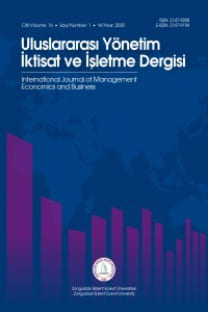YÖNETSEL DEĞER FARKLILIKLARI ÖLÇEĞİ
Çalışmanın konusunu, yöneticilerin kültürel boyutlar bağlamında sahip olduğu değerler oluşturmaktadır. Çalışmanın amacı kültürel boyutları ifade eden yönetsel değerleri ortaya koymaktır. Bu doğrultuda örgütlerde, yöneticilerin değer yapısını belirlemek için yönetsel değer farklılıkları ölçeği oluşturulmuştur. Yönetsel değer farklılıkları ölçeği Hofstede’nin kültürel boyutları temel alınarak geliştirilmiştir. Özellikle kültürel değerlere ilişkin farklı ülkelerde geliştirilen bir ölçeğin bir başka ülkedeki çalışanlara uygulanması uygun olmayabilmektedir. Ölçek kendi ülkesindeki değerler temel alınarak geliştirilmiştir. Bununla birlikte kültürel değişim algısı da bir boyut olarak ölçeğe eklenmiştir. Bu gibi özelliklerden dolayı ölçek diğer çalışmalardan farklı olmuştur. Ölçeğin geliştirilme sürecinin pandemi koşullarına denk gelmesi çalışanlara ulaşmayı geciktirmiştir. Çalışma mermer, hizmet ve tekstil alanlarında yapılmıştır. Yönetsel değer farklılıkları ölçeği bireycilik, toplulukçuluk, eril değerler, dişil değerler, yüksek güç mesafesi, düşük güç mesafesi, belirsizlikten kaçınma oranı yüksek, belirsizlikten kaçınma oranı düşük ve kültürel değişim algısı olmak üzere 9 faktörlü yapıda oluşmuştur. Cronbach’s Alpha katsayısı 0,85, KMO değeri 0,93, toplam açıklanan varyans değeri 60,55 olarak bulunmuştur. Doğrulayıcı Faktör Analizi sonucunda GFI değeri 0,91, NFI değeri 0,93, CFI değeri 0,95, CMIN/DF değeri 2,54 ve RMSEA değeri 0,036 olarak bulunmuştur.
Anahtar Kelimeler:
Kültür, Değer, Kültürel Boyutlar, Yönetsel Değer Farklılıkları
MANAGEMENT VALUE DIFFERENCE SCALE
The subject of the study is the values that managers have in the context of cultural dimensions. The aim of the study is to reveal managerial values that express cultural dimensions. In this direction, a scale of managerial value differences was created to determine the value structure of managers in organizations. The scale of managerial value differences was developed based on Hofstede's cultural dimensions. It may not be appropriate to apply a scale developed in different countries regarding cultural values to employees in another country. The scale was developed based on the values in its own country. In addition, the perception of cultural change was added to the scale as a dimension. Due to such features, the scale was different from other studies. The fact that the development process of the scale coincided with the pandemic conditions delayed reaching the employees. The study was carried out in the fields of marble, service and textile. The scale of managerial value differences consists of 9 factors: individualism, collectivism, masculine values, feminine values, high power distance, low power distance, high uncertainty avoidance, low uncertainty avoidance and cultural change perception. Cronbach's Alpha coefficient was 0.85, KMO value was 0.93, and total explained variance value was 60.55. As a result of Confirmatory Factor Analysis, GFI value was 0.91, NFI value was 0.93, CFI value was 0.95, CMIN/DF value was 2.54 and RMSEA value was 0.036.
Keywords:
Culture, Value, Culturel Dimensions, Managerial Value Differences,
___
- Referans1 Hofstede, G. (1980). Motivation, leadership, and organization: Do American theories apply abroad?. Organizational Dynamics, 9, 42–63. Referans2 Hofstede, G. (1984). Cultural dimensions in management and planning. Asia Pacific Journal of Management, 81-99.
- ISSN: 2147-9208
- Başlangıç: 2005
- Yayıncı: Zonguldak Bülent Ecevit Üniversitesi
Sayıdaki Diğer Makaleler
ADAM KAYIRMANIN ÖNCÜLÜ OLARAK MAKYAVELİZM: AMPRİK BİR ARAŞTIRMA
DÖRDÜZ AÇIK HİPOTEZİ: TÜRKİYE EKONOMİSİ ÜZERİNE BİR ANALİZ
Alpaslan YAŞAR, Neriman YALCİN
Ahmet TUNÇ, Savaş SAVAŞ, Doğan BARAK
KRİPTO PARA PİYASASINDA VOLATİL DAVRANIŞLARIN ASİMETRİK STOKASTİK VOLATİLİTE MODELİ İLE TESTİ
Magsud GUBADLI, Vedat SARIKOVANLIK
ÜRETİM YÖNETİMİNDE DİJİTAL DÖNÜŞÜM: BİBLİYOMETRİK TEMELLİ SİSTEMATİK BİR İNCELEME
Fatma DEMİRCAN KESKİN, Ural Gökay ÇİÇEKLİ
